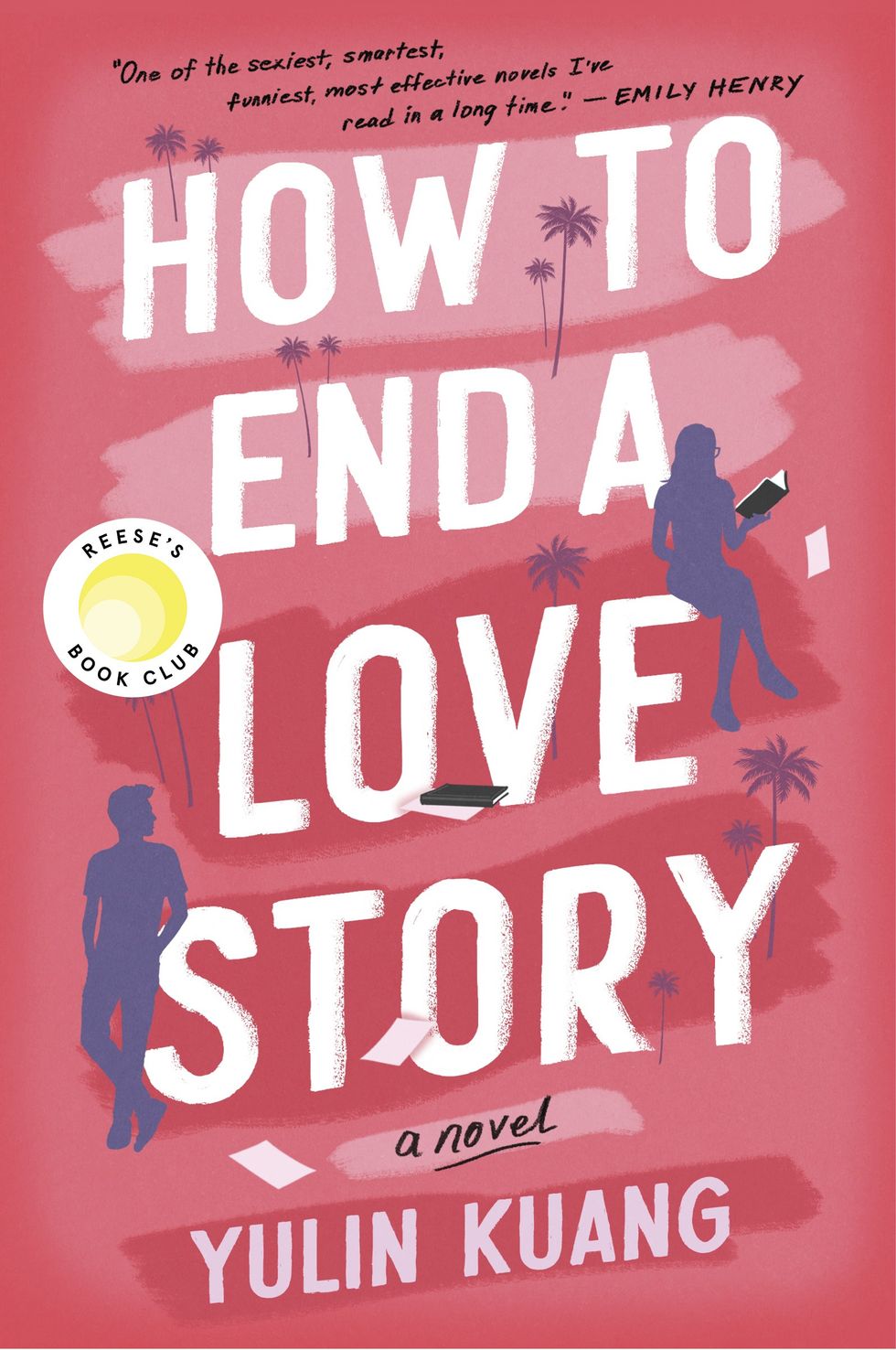This Reese's Book Club pick breathes new life into romance.
Yulin Kuang’s Debut Novel “How To End A Love Story” Is Summer's Hottest Book Club Pick

Staff Writer, Jasmine Williams, covers a variety of topics from home decor to beauty and everything in between. She has bylines at Motherly, The Everymom, and Byrdie where she wrote about motherhood, beauty, health and relationships. Jasmine knew she wanted to be a writer when she realized she was actually interested in reading the articles in her mom's favorite magazines — and she may or may not have ripped her favorite articles out to study them later. When she's not working, you can find Jasmine playing make-believe with her toddler, spending an undisclosed amount of time in Target or TJ Maxx, and searching for a family-friendly puppy to add to her family.
I've got a thing for Reese Witherspoon's book club which is why I couldn't wait to get my hands on Yulin Kuang's debut novel How to End a Love Story. Chosen as Reese's Book Club's May Pick, it features a romance that almost shouldn't make sense. I mean, when's the last time you realized you trauma bonded with someone? Except Helen Zhang and Grant Shepard's character arcs as well as the entire plot of How to End a Love Story doesn't even feel like that.
Instead, Yulin uncannily peels back the layers of what it means to be a layered human being who happens to be carrying trauma, talent, success, imposter syndrome, and burning desire in their hearts. Even that doesn't scratch the surface of who Helen and Grant are. Trying to capture their essence feels like I'm stumbling over my words which points to how great this novel is and that means Yulin's goal has been accomplished.
Though she loves perfectly executed rom-coms and is fortunate to be working on them in the filmmaking space, she doesn't consider How to End a Love Story as one. "...I was searching for something more aligned with the Brontë sensibility of romance in the writing of this book. Less warmth and charm, more id-level storytelling and unchecked carnal desire," she explains.
Yulin Kuang's Journey To "How To End A Love Story"

Image via Zach Wallnau
Some people seem to be born knowing they're destined to right, but some of us stumble into it and realize, "Hey, I'm pretty good at this." For Yulin, her journey to her debut novel How to End a Love Story takes the latter route. Her first dream, you make ask? To be an Olympic figure skater.
"...that didn't pan out so I turned to storytelling," Yulin admits. That pivot led her to set her sights on becoming an author as she began honing her creative writing skills via your classic marble composition notebooks. If you're still wondering if she kept some of them, the answer is yes!
The screenwriter and author then found herself drawn to other aspects of writing and film. She says, "I eventually fell in love with screenwriting and directing while in undergrad at Carnegie Mellon, and I spent my first decade post-grad concentrating on my filmmaking career."
Yulin Kuang's Approach To Filmmaking
It's a reason why her hard work and the stars aligned for her to adapt Emily Henry's Beach Read and People We Meet on Vacation.
When I ask what helps her approach the book-to-film trajectory, she credits writing fan fiction. This feels similar to Christina Lauren's own experience, further proving that fan fiction deserves the utmost praise for helping some of the best literary and film minds who ultimately birth what I could only describe as masterpieces.
Yulin says, "Fan fiction is where I first learned you could play with characters originated by someone else to discover what you’d make them do in your own version." Although it would be easy for anyone to snap their fingers and have their first pitches accepted by everyone, she learned to lean on what writing fan fiction taught her.
"Early in my career, I would pitch on book-to-film adaptations and I’d be like, 'Change nothing, just shoot the book!' And I wouldn’t get those jobs, because I didn’t have a clear “take” and because you can’t actually just shoot a book – adaptation is an art form unto itself. So onceI started approaching adaptation with more of a fan fiction mindset – 'What is my take on these characters and this world?' – that helped me approach the book-to-screen trajectory more successfully," she proudly says.
However, this doesn't mean she never questioned if she could still find ways to create new ideas. "...in 2021, at a time when everything else I was working on was an adaptation, I found myself wondering if I had anything original left within me," she remembers.
It's natural for creatives to experience moments of doubt, but Yulin has been able to turn the tide and discover untapped ideas in her mind. Just don't expect her to set her own expectations about any adaptations she's working on.
She says, "Know that I am an avid reader of romance and a frequent consumer of this genre across mediums, and I will be bringing everything I know going into these adaptations. But more specifically to Beach Read, which I have more creative ownership over as the writer/director."
How Yulin Kuang Relates To Her Main Characters In "How To End A Love Story"

And since How to End a Love Story is truly Yulin's own creative body of work, it makes sense that main characters Helen and Grant have pieces of her personality as well as her characteristics.
"I gave Helen all my hopes and insecurities from high school and gave her the alternate universe path where I had pursued publishing instead of Hollywood. I examined what might have happened if I’d grown into certain qualities I’ve actively tried to grow away from," she says of Helen Zhang.
Right away, readers get the sense that Helen is a whip-smart and hardworking, but her penchant for being cautious about her success also peeks through. Though she's written highly successful YA (read: young adult) novels, Helen waits with bated breath for the moment people will call her bluff. She's relatable because many of us wonder if we're simply cosplaying as versions of ourselves who've reached any level of success.
On the other hand, there's Grant Shepard. He's seemingly this cool, calm, and collected screenwriter who has a complicated past with Helen. Yulin says, "I gave Grant a lot of the qualities I’m proud of and/or have coveted as a working screenwriter, and I certainly relate to many of his thoughts on screenwriting and the current state of our industry."
The more the reader learns about Helen and Grant, the more it becomes obvious that there's more to them than meets the eye. Sure, they are complicated...but who isn't?
"At their core, Helen and Grant are just two kids from Jersey trying to make it in Hollywood, and of course I relate deeply to that," she says.
Yulin Kuang's View Of Rom-Coms
Based on Yulin's genuine interest in romance novels and the fact she's well-versed in adapting them, she knows what it takes to make rom-coms flourish. Her first take? "Romantic tension is key to any romance – I always need to know why our couple can’t be together now. The second that tension is gone, so is audience interest," she points out.
This explains why we can't get enough of reading books about it, listening to albums dedicated to it, or watching films that depict all levels of romance. Still, there are some people who approach the genre with a side eye.
"There seems to be a natural human suspicion of things that make us feel too good – like, 'That can’t possibly be good for us, that’s just candy!' I wonder if it’s something evolutionary at work," she says before doubling down. "You can’t argue with the fact that people absolutely fucking love rom-coms, and I will die on the hill that a well-earned happily ever after is both harder to achieve and more narratively satisfying when it’s pulled off successfully."
She's the type of writer who really appreciates a big kiss that's handled correctly onscreen, but she's also not afraid to "groan every time it's fumbled." But, she knows everyone still won't see romance the way she and so many others view it, but she doesn't really care.
"Ultimately, I don’t concern myself too much with changing minds that don’t want to be changed.There are enough smart people who recognize the power and value of rom-coms, and I’d rather spend my precious time creating art to surprise and delight the people with good taste."
Need I say that this is yet another reason why How to End a Love Story works so well?
How Yulin Kuang Wishes The World Would Celebrate AAPI Month
As much as she's vocal about screenwriting and rom-coms, Yulin also has thoughts about the way society-at-large talks about BIPOC creative artists. "There’s a real, 'This is important, eat your vegetables,' vibe to things. And while that might be true, it’s not the most appealing way to market or discover art," she says.
She admits this could be due to how many diversity-in-film panels she's attended. As a Black woman, the conversations I see every year during Black History Month seem to have a certain "Let's check this box so everyone can be happy" vibe, so I can imagine attending panels about diversity and inclusion can start to sound repetitive after awhile.
Yulin doesn't hold back when she says, "I’m a little jaded when people ask me diversity questions at this point. I don’t want to attract the kind of readers who are only showing up to be supportive of my Asian-ness. It’s a bit like showing up to a date where someone says, 'I’m so excited that you’re Asian!!!'" This is an analogy I can so get behind because it makes a lot of sense!
It's one thing to have representation, but I like to think it's always obvious when people are approaching the conversation in a way that 'others' BIPOC people. We're literally not asking for a trophy, but more so an acknowledgement that we shouldn't be excluded from conversations, spaces, and careers or treated differently.
This sentiment is shared by Yulin who says, "That’s the thing about me that I didn’t do on purpose, and while I’m glad you’re excited, I hope there are things that I did do on purpose that you find exciting, too" and feels there is a way to be a genuine ally.
"...support AAPI creatives by all means, and perhaps begin by celebrating us as individual artists even after the designated month ends. And where applicable, talk about our work like it’s candy, not vegetables. I’d rather be irresistible than important," she states.
Take a page from Yulin Kuang's book and pick up a copy of How to End a Love Story today! You won't regret it!
Looking for more reading recs? Be sure to check out our storefront for more of our fave books!
Brit + Co may at times use affiliate links to promote products sold by others, but always offers genuine editorial recommendations.
Lead image via Amazon



















